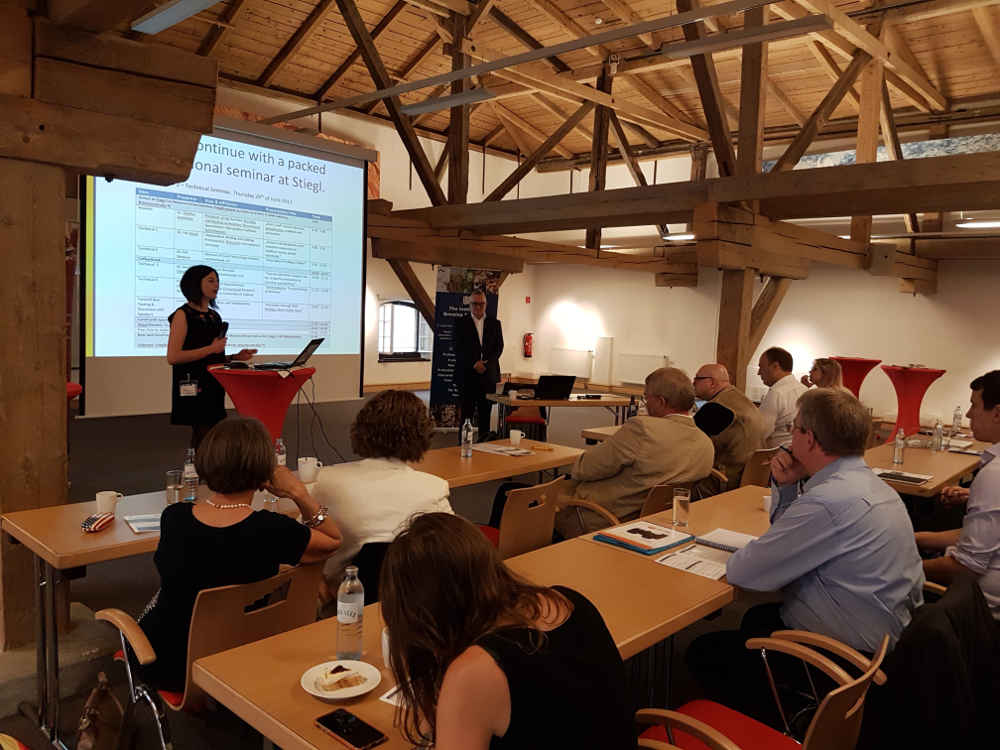What does the beer drinker want? IBD Masterclass explores sensory science
As the UK continues to sever its political ties with the EU, it was only fitting that the Institute of Brewing and Distilling (IBD), an organization with 5,000+ members, re-established its links to its continental constituents by organising a seminar in Salzburg.
After all, 19 percent of IBD members are currently kind of scattered across the rest of the world – that is outside the strong UK, Africa and Asia-Pacific sections.
As Michaela Miedl, AB-InBev, who co-hosted the event with Stephen Wilkinson, SFW Consulting & Services, Vienna, said in her introduction, their aim was to create a community in Europe around the IBD and the best way to do this is to bring people together in a learned and entertaining format.
The two-day seminar was held in Salzburg, Austria, at the end of June 2017 and attracted around 50 participants. The choice of Salzburg proved ideal for at least three reasons: Austria’s vibrant brewing industry (represented by Dr Günther Seeleitner, President of the Austrian Brewing and Malting Association), the country’s geographical location (within easy reach for a group of Czech brewers) and its prestige as the birthplace of psychoanalysis. The founder of psychoanalysis, Sigmund Freud, practiced in Vienna at the turn of the 20th century.
Although psychoanalysis was not explicitly on the agenda, the seminar’s topic “Applied sensory and consumer science” still had a lot to do with what goes on in the consumer’s mind when drinking beer. In this respect, the seminar’s papers helped review long-held preconceptions about what consumers actually want from a beer.
In her presentation on the craft beer phenomenon, Dr Ina Verstl, BRAUWELT International, explained that craft beer cannot be reduced to a plethora of new and unique beer styles. It’s above all a politically or ideologically informed purchasing/consumption decision, whereby the so-inclined consumer taps into the craft beer discourse (local, anti-global, anti-big, anti-marketing) and thus establishes a political-emotional bond with the product.
Alerting the audience to the mind’s role in our tasting experience, Prof Charles Spence, University of Oxford, UK, an expert in gastrophysics science, which links gastronomy and measurable psychophysics, pointed out that flavour is far from central when it comes to having a pleasurable drinking experience. It’s our sense of sight which is strongest (the look of the packaging, the glass, etc.), which has to be satiated first, followed by smell and sound. He reminded the audience that when it comes to purchasing decisions in a bar, lighting and general atmosphere should not be underestimated as they have an enormous impact.
Turning to science and technology, presentations by Dr Bill Simpson, Cara Technology, UK, and Dr Jacek Obuchowicz, New Food Innovation, UK, revealed how they can help brewers to provide customers with the best possible product. Drawing on decades of experiences, Dr Simpson showed that tasters at breweries can be trained to do descriptive profiling much like machines. Only by eliminating tasters’ expectations, can taste panels deliver objective descriptors and results. After all, the point of brewery beer tastings is to define the flavour of the beer and to communicate it without leaving any room for doubt or interpretation.
Explaining his work with an “electronic tongue”, Dr Obuchowicz drew on his work with coffee to show how this instrument can differentiate basic tastes (not flavours), allowing for product mapping. His research on coffee in capsules underlined that electronic tongues can screen coffee beans to such an extent that replicating formulations according to bitterness and acidity levels, for example, becomes almost a child’s game. But electronic tongues can have other applications, too, like when dealing with customer complaints or with product ageing, Dr Obuchowicz said.
After all those academic papers, it was time for some practical applications. It was THE expert in this field, the beer writer Conrad Seidl, who conducted a beer tasting of some most unusual beers.
Members of this masterclass thoroughly enjoyed the hospitality provided by the local breweries Augustiner and Stiegl. It is hoped that the IBD already has some future seminars lined up in continental Europe.

